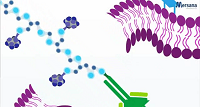 |
| The antibody (green) carrying the polymer backbone (blue) and conjugated drug (dark blue) through the target cell's membrane (purple)--Screenshot courtesy of Mersana |
Fierce 15 member Mersana Therapeutics, a developer of customizable next-generation antibody-drug conjugates, announced that its lead anticancer candidate showed promise in preclinical studies.
XMT-1522 targets the HER2 protein using a novel ADC that binds to a different epitope than existing anti-HER2 antibodies, Mersana says. The drug delivery vector carries an average of 15 proprietary payload molecules of the anticancer agent, auristatin.
"Current HER2-targeted therapies are effective in treating HER2-positive cancers, but only address roughly 20 percent of patients with breast or gastric cancer," Mersana chief medical officer Dr. Donald Bergstrom, said in a statement. "Our preclinical data suggest that XMT-1522 has the potential to greatly expand the number of patients who may benefit from HER2-targeted therapies, because the compound provides efficient drug delivery in cancers where there are as few as 10,000 HER2 receptors, where other therapies are inactive."
Mersana said the candidate was well tolerated in nonhuman primates and demonstrated efficacy in small doses. It also has potential as a combination therapy with Genentech's Perjeta (pertuzumab) and Herceptin (trastuzumab) for HER2-positive breast cancer.
More details will be presented today at the American Association for Cancer Research annual meeting in Philadelphia.
The biotech boasts partnership with Takeda potentially worth $300 million in milestone payments, and another with Germany's Merck KGaA worth up to $792 million. Both are in the ADC arena.
Longtime biotech vet Anna Protopapas recently took the helm of the company on the heels of a $35 million Series B financing. "I'm excited about the Mersana technology," she said in an interview with FierceBiotech. "It overcomes a lot of challenges with first-generation ADCs."
Mersana aims to fine-tune antibody-drug conjugates, which involve engineering antibodies so that they can carry the attached drugs to specific targets.
In Mersana's drug delivery system, the antibodies bind to the company's Fleximer polymer backbone, to which drugs are linked, for targeted delivery. With the company's next-generation conjugation technologies, "you can really fine-tune the linker and the payload to the appropriate target," she said.
Special Report: FierceBiotech's 2012 Fierce 15 - Mersana Therapeutics